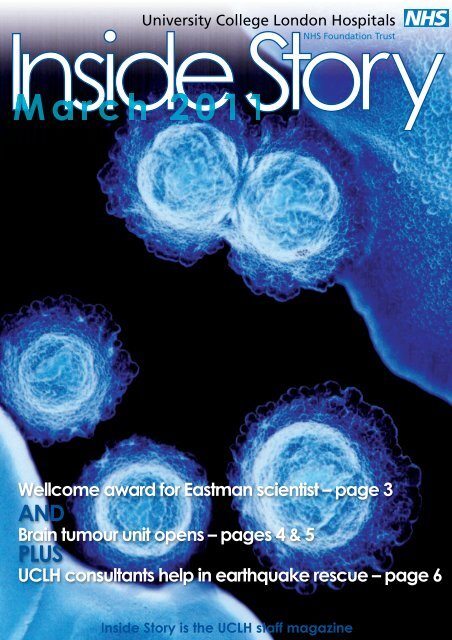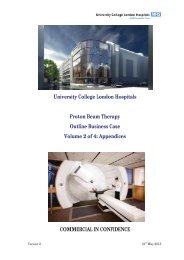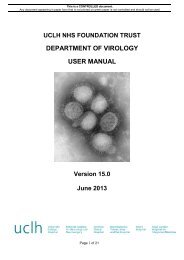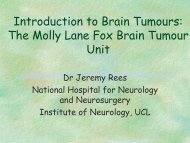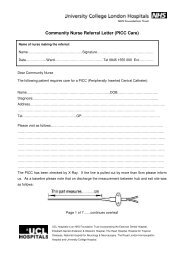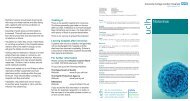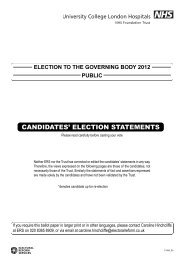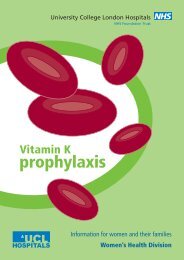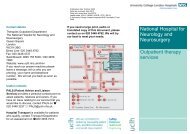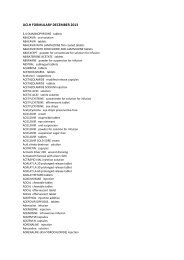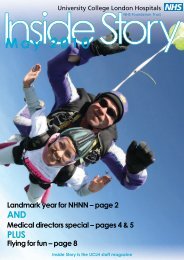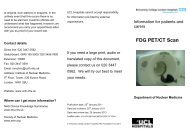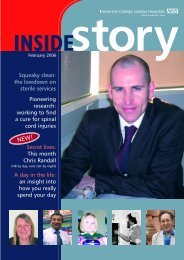AND PLUS - University College London Hospitals
AND PLUS - University College London Hospitals
AND PLUS - University College London Hospitals
Create successful ePaper yourself
Turn your PDF publications into a flip-book with our unique Google optimized e-Paper software.
Inside Story<br />
Wellcome award for Eastman scientist – page 3<br />
<strong>AND</strong><br />
Brain tumour unit opens – pages 4 & 5<br />
<strong>PLUS</strong><br />
UCLH consultants help in earthquake rescue – page 6<br />
Inside Story is the UCLH staff magazine
news<br />
Healthcare assistant named Apprentice of the Year<br />
She’s enthusiastic, hard working and<br />
conscientious – just the kind of traits to<br />
impress Lord Alan Sugar in the<br />
boardroom. But even though the NHS<br />
<strong>London</strong> awards ceremony was not in<br />
the same league as the TV show, it<br />
proved just as exciting.<br />
“I feel so honoured – hopefully it will<br />
open doors for me and give me the<br />
confidence to learn more and progress<br />
more,” said Carla Jivraj who works in<br />
the GI physiology unit at The<br />
Rosenheim.<br />
The <strong>London</strong> NHS Apprenticeship<br />
awards were presented by Tim<br />
Campbell (pictured right with Carla),<br />
former winner of the BBC show The<br />
Apprentice and chief executive of The<br />
Bright Ideas Trust (a charity to help<br />
young people turn ideas into a<br />
business).<br />
Carla, who won the over-25 category,<br />
was nominated by Dr Amanda<br />
Raeburn. She described Carla as an<br />
integral member of the team who helps<br />
ensure the GI Physiology unit runs<br />
smoothly.<br />
As part of the<br />
apprenticeship scheme,<br />
Carla completed eight<br />
evidence-based<br />
modules for which she<br />
was awarded the NVQ<br />
Health and Social Care<br />
level 3, as well an<br />
apprenticeship scheme<br />
certificate. She said<br />
Jane Connor, HCA<br />
development nurse,<br />
offered her guidance<br />
and support<br />
throughout.<br />
The NHS<br />
Apprenticeship Scheme<br />
offers participants the<br />
chance to achieve<br />
nationally recognised qualifications<br />
whilst working. There are 800 NHS<br />
<strong>London</strong> apprentices across a range of<br />
career areas.<br />
The <strong>London</strong> NHS Apprentice Awards<br />
were held by NHS <strong>London</strong> in<br />
Tim Campbell with Carla Jivraj<br />
partnership with the Greater <strong>London</strong><br />
Authority.<br />
Managers who are interested in<br />
introducing an apprenticeship<br />
programme for their staff should<br />
contact Marita Brown, head of training<br />
and development.<br />
NHS Pensions Choice<br />
– are you eligible?<br />
If you were aged under<br />
50 on 1 October 2009<br />
and joined the NHS<br />
before 1 April<br />
2008 then you might<br />
be eligible for the NHS<br />
Pensions Choice<br />
scheme.<br />
Staff who qualify<br />
should have received<br />
an information pack. If you are eligible, did not receive<br />
a pack and are interested in finding out more, please<br />
contact the Trust pensions department, on ext 79547.<br />
For further guidance contact the NHS Pensions<br />
helpdesk on 0300 123 1601 or visit their website at:<br />
www.nhsbsa.nhs.uk/pensions<br />
Please note that transferring your pension is a<br />
personal decision; UCLH and NHS Pensions are<br />
unable to give financial advice.<br />
This project is not related to the Hutton Report, which<br />
reviewed public service pension provision, which was<br />
published on 10 March.<br />
Phone number changes<br />
underway across UCLH<br />
A major project is underway<br />
which will see all phone<br />
numbers change across the<br />
Trust between April and<br />
September this year.<br />
The next big milestone will be<br />
at the Eastman Dental Hospital<br />
on April 17 when:<br />
The new EDH number will<br />
become 020 3456 7899<br />
All existing four-digit EDH<br />
extensions change to fivedigits<br />
by adding the number<br />
6 (ext 1111 would become<br />
61111)<br />
Staff must add 020 345 to<br />
the start of the EDH<br />
extension number to create<br />
the full telephone number<br />
(eg 020 3456 1111)<br />
The emergency telephone<br />
number at the EDH will<br />
change to 62222<br />
Earlier this month (March), all<br />
staff with four digit extension<br />
numbers that begin with a '9'<br />
had their internal and external<br />
numbers altered.<br />
Please see the project page on<br />
Insight for more information<br />
about how to work out new<br />
numbers and a timetable of<br />
changes for other sites across<br />
the Trust.<br />
Posters will be available to<br />
display in appropriate areas<br />
and leaflets will also be<br />
produced. For more information<br />
contact John McGhee, project<br />
manager, on ext 75135.<br />
Contact Us<br />
If you have any information you would like included in Inside Story, or on the Trust intranet<br />
site Insight, contact: Communications Unit, 2nd Floor Central, 250 Euston Road, <strong>London</strong><br />
NW1 2PG. Email: communications@uclh.nhs.uk, Tel: ext 9897, Fax: ext 9401.<br />
Front cover: Bacteria – by<br />
Derren Ready, clinical scientist.<br />
(Story on page 3)<br />
2
news<br />
Future leaders – sign up here<br />
If you think you’ve got the talent and<br />
tenacity to become an NHS leader of<br />
the future, signing up for the graduate<br />
management training programme<br />
could be the first rung to success. It is<br />
now recruiting applicants for the 2011<br />
intake.<br />
UCLH helps nurture a number of<br />
rising stars each year as part of the<br />
graduate programme, which includes<br />
on-the-job experience and the chance<br />
to gain invaluable educational<br />
qualifications. It’s also a great way to<br />
develop an impressive network of<br />
professional contacts. Applicants<br />
need a 2.2 degree or equivalent in<br />
any subject.<br />
Trainees include Katie Lahiffe who<br />
beat off stiff competition from around<br />
12,000 applicants. She is currently<br />
undertaking her second year<br />
placement at the Trust as a trainee<br />
manager in HR, as well as studying<br />
for her Masters degree in HR<br />
management at Middlesex <strong>University</strong>.<br />
Katie said: “It’s a great scheme and<br />
offers amazing opportunities for<br />
personal and professional<br />
development and exposes you to a<br />
wealth of practical experience.”<br />
Although the application process can<br />
be tough lengthy, Katie says it is<br />
absolutely worth the effort.<br />
“Graduate trainees are a<br />
tradition at UCLH.<br />
Colleagues make sure<br />
opportunities are<br />
available to you – and it’s<br />
up to you to seize them!”<br />
Graduate trainees Jitesh Sudera and Katie Lahiffe<br />
personal skills to excel in whichever<br />
area you eventually decide to<br />
specialise in.”<br />
Continual assessment, training days<br />
and assignments are part of the<br />
scheme. “It can be tough to study after<br />
a full day at work- but the rewards are<br />
Award for creative scientist<br />
worth it.” said Jitesh.<br />
Visit the following websites if you want<br />
some more information about the<br />
scheme: www.institute.nhs.uk or<br />
www.nhsgraduates.co.uk, or email<br />
Marita Brown, head of training and<br />
development.<br />
Derren Ready, a clinical scientist from the Microbiology department at the<br />
Eastman Dental Hospital, has won a Wellcome Image award for his colourenhanced<br />
photomicrograph of a species of bacteria that cause dental plaque.<br />
The Wellcome Image Awards recognise the creators of informative, striking<br />
and technically excellent images. Derren’s image, plus those of a further 20<br />
other winners are on display at the Wellcome Collection until 10 July 2011.<br />
Manchester <strong>University</strong> graduate Jitesh<br />
Sudera is currently working as a<br />
management accountant for the<br />
cancer division, ensuring accurate<br />
financial reporting.<br />
Jitesh said: “Graduate trainees are a<br />
tradition at UCLH. Colleagues make<br />
sure opportunities are available to you<br />
– and it’s up to you to seize them! It’s<br />
not just about finance, the 360 degree<br />
approach ensures you appreciate all<br />
aspects of the NHS. The training arms<br />
you with the right management and<br />
3
NHNN brain tumour unit<br />
Brain tumour unit opens<br />
The NHS took a major step forward in<br />
improving the care of patients with<br />
brain cancer after the NHNN opened<br />
the country's first dedicated brain<br />
tumour unit.<br />
The National Brain Appeal (formerly<br />
the National Hospital Development<br />
Foundation), the charity that supports<br />
the hospital by funding clinical posts,<br />
cutting edge technology, infrastructure<br />
and research, has invested a total of<br />
£2.5 million in the unit and brain cancer<br />
service.<br />
Dr Jeremy Rees, clinical lead for the<br />
unit said, "The Molly Lane Fox Unit, as<br />
it will be known, will enable us to<br />
provide more rapid assessment and<br />
treatment as well as concentrating the<br />
multidisciplinary expertise available to<br />
our patients in one place. Through the<br />
generosity of the Lane Fox family and<br />
their friends and relatives, together<br />
with the support of The National Brain<br />
Appeal who have done so much to<br />
raise the vital funds, the dream of<br />
being able to care for brain tumour<br />
patients in this unique environment has<br />
now become a reality.”<br />
Every day at least 20 people in the UK<br />
are diagnosed with a brain tumour. The<br />
brain tumour unit and its pioneering<br />
team of specialist doctors, nurses,<br />
therapists and researchers will pave<br />
the way for breakthroughs in the<br />
treatment and understanding of the<br />
disease for the benefit of anyone<br />
affected in the UK.<br />
Some of the brain tumour unit team<br />
Patients will benefit from rapid<br />
assessment and treatment thanks to<br />
the dedicated unit and multidisciplinary<br />
team – all specialists in brain tumours.<br />
The 12-bed inpatient and assessment<br />
unit will provide support for patients,<br />
families and carers while they are in<br />
hospital and after they are discharged.<br />
Work on clinical trials and research into<br />
tumours also forms a fundamental part<br />
of the work carried out by the team.<br />
The hospital’s comprehensive brain<br />
cancer service has developed<br />
significantly over the past three years,<br />
with key clinical and research staff<br />
recruited with the help of the charity.<br />
Patients at the brain tumour unit will<br />
also benefit from other recent charity<br />
supported investments such as the<br />
latest MRI scanning equipment in the<br />
hospital’s neuroimaging suite and the<br />
interventional MRI operating theatre.<br />
Some of the nursing staff, plus ward domestics and the ward clerk at the brain tumour unit<br />
Elaine Hill, clinical brain tumour unit manager and<br />
Jeremy Rees, clinical lead to the unit<br />
4
NHNN brain tumour unit<br />
Ron’s journey<br />
What better way to thank the hospital which<br />
saved your life than embarking on mammoth<br />
treks across foreign lands to raise funds for a<br />
new inpatient unit.<br />
That’s precisely what Ron Gainsford, OBE, did<br />
after he was treated at the NHNN for a brain<br />
tumour which was first identified in 2003.<br />
Following two successful operations at the<br />
hands of NHNN neurosurgeon Michael Powell<br />
– one in 2003 and another in 2010 when his<br />
tumour returned – Ron wanted to give<br />
something back.<br />
During his time at the NHNN the 60-year-old<br />
father of four said he had always been struck<br />
by how much the staff genuinely cared for their<br />
patients.<br />
So when he heard about the work of The<br />
National Brain Appeal which was organising a<br />
trek to Nepal, he saw it as the perfect<br />
opportunity to show his gratitude and<br />
appreciation. This was back in 2004 and he<br />
was joined on the trek by his surgeon, Michael,<br />
and many other NHNN staff members. Ron<br />
followed this up with treks to Patagonia and<br />
Ecuador, raising around £17,500 in total.<br />
Looking back on the last seven years Ron<br />
said: “Out of bad comes a lot of good. I have<br />
been to places and done things I never<br />
expected to and had great experiences.<br />
"This July I am setting off on my latest<br />
challenge, an arctic tour with my motorbike!”<br />
Theresa Dauncey, chief executive of The<br />
National Brain Appeal, said: "There is a real<br />
and pressing need for more research and<br />
investment into understanding and treating<br />
brain cancer. We hope the public will continue<br />
to donate to this vital work and we urge people<br />
to be ‘brain aware’ and note the symptoms.<br />
Severe headaches, fits, unexplained<br />
numbness, vision, speech or concentration<br />
problems could all be signs of a tumour."<br />
Unit named after Molly<br />
The new brain tumour unit was named after Molly<br />
Lane Fox (pictured) who died from an inoperable<br />
brain tumour aged just five.<br />
In November 2007, what appeared to be an<br />
innocent cough took a sinister turn. Molly<br />
started to have headaches which were<br />
relieved by being sick. On December 10 she<br />
was diagnosed with a diffuse pontine glioma<br />
– a malignant tumour that needs a million<br />
cells to see it and once you can see it, it’s<br />
too late.<br />
Oliver and Hatty Lane Fox said: “Nothing<br />
prepares you for a shock like this. Or<br />
for the prognosis that the tumour is<br />
inoperable, chemotherapy is<br />
ineffective and the steroids and<br />
radiotherapy may buy a little precious<br />
time but no more.”<br />
Oliver and Hatty described Molly’s<br />
medical and palliative support as<br />
‘superb’ but found that clinical trials<br />
into brain tumours were few and far<br />
between in the UK. Specialists in<br />
brain tumours work out of different<br />
hospitals and there was no<br />
dedicated service on one site.<br />
They were inspired to support the fundraising<br />
efforts of The National Brain Appeal to fill this<br />
gap and provide hope for patients in a similar<br />
position.<br />
“It was heartbreaking to watch our<br />
beautiful angel decline slowly while<br />
this terrible disease took its toll.<br />
Eventually she died peacefully at<br />
home, just seven months after<br />
being diagnosed,” said Oliver<br />
and Hatty.<br />
Molly's Fund, the charity set<br />
up in her memory, has now<br />
raised over £600,000 for The<br />
National Brian Appeal with<br />
pledges of over £120,000 to<br />
come.<br />
Oliver and Hatty added: “We feel<br />
passionately that nobody should go<br />
through what this little person endured.<br />
Brain cancer in the UK is woefully under<br />
funded and under researched. It is time<br />
something was done to change that. The<br />
new Molly Lane Fox Unit will transform the<br />
treatment of brain cancer in this country.”<br />
5
interview<br />
6<br />
Consultants help rescue operation amid New Zealand devastation<br />
Professor Tony Mundy and Mr Julian Shah talk to Elke Tullett<br />
Two of our consultant surgeons aided<br />
rescue workers following the<br />
earthquake which devastated<br />
Christchurch in New Zealand.<br />
The hotel in which Professor Tony<br />
Mundy and Julian Shah were based<br />
was seriously damaged following the<br />
disaster which claimed more than 160<br />
lives last month.<br />
Their passports, clothes, laptops,<br />
tickets and credit cards still remain<br />
buried inside the remains of the<br />
Crowne Plaza hotel where they were<br />
staying for a prestigious conference.<br />
But they were among the lucky ones.<br />
And their medical expertise proved<br />
invaluable as part of the rescue<br />
operation that followed.<br />
When the shock tremor struck at<br />
12.51pm on Tuesday February 22 they<br />
had left the hotel and were waiting for<br />
the afternoon session of the Australian<br />
and New Zealand Urological<br />
Association Conference to begin.<br />
“We had just finished lunch when there<br />
was a noise like an underground train<br />
coming towards us, everything began<br />
to shake, glass shattered … we were<br />
all thrown to the ground,” said<br />
Professor Mundy, UCLH’s corporate<br />
medical director.<br />
“After several minutes, we stumbled<br />
out of the building and very soon after<br />
made a conscious decision to do<br />
whatever we could to help those who<br />
were injured. No one was any great<br />
hero – everyone did what they could to<br />
help.”<br />
Prof Mundy and Mr Shah separated<br />
and headed towards the nearby<br />
cathedral square which bore the brunt<br />
of the devastation.<br />
Some of the devastation in New Zealand<br />
Julian Shah in New Zealand<br />
Prof Mundy helped free several people<br />
buried under collapsed buildings and<br />
assessed those in need of urgent<br />
treatment. He also reassured others<br />
who were hysterical or bloodied but<br />
not suffering from serious injuries.<br />
Prof Mundy added: “Some were<br />
stumbling around with dramaticlooking<br />
injuries which were not serious<br />
and I was able to tell them not to<br />
worry. With others it was too late –<br />
there was nothing I could do to help<br />
them.”<br />
“I helped put a drip in<br />
the woman’s arm using<br />
the light from my<br />
mobile phone.”<br />
Meanwhile, Mr Shah was<br />
commandeered by rescue crews to<br />
provide medical help to a woman<br />
trapped in a nearby building.<br />
He said: “We walked up three floors in<br />
the darkness and then the stairs<br />
stopped – there was nothing. The<br />
woman had two big beams lying<br />
across her. I could see that her arm<br />
was broken and I said ‘don’t worry –<br />
we’ll get you out’. Then there were a<br />
couple of tremors and the building<br />
shook and, at that point, it was scary.“<br />
The woman was brought down in a<br />
rescue crane and taken to hospital<br />
accompanied by Mr Shah.<br />
“There was a power cut and everyone<br />
was milling around. I helped put a drip<br />
in the woman’s arm using the light<br />
from my mobile phone.<br />
“People were saying we were heroes<br />
and although I wouldn’t go that far,<br />
both Tony and I did our best – we<br />
didn’t shirk from trying to help.”<br />
The next few days passed in a bit of a<br />
Prof Tony Mundy<br />
blur against a backdrop of 300 more<br />
earthquake shocks. The last two days<br />
of the conference were cancelled and<br />
acquaintances offered Tony, Julian and<br />
other conference delegates a place to<br />
sleep. “The hotel was badly<br />
damaged…everything I own on this<br />
trip is buried under rubble.”<br />
Despite the traumatic experience, Tony<br />
was determined to continue with his<br />
plans to undertake surgery at the<br />
Tauranga Hospital on the North Island.<br />
It was there that I finally caught up with<br />
him – to talk to him about his<br />
experiences.
our trust<br />
Enjoying art<br />
Older patients at UCH have been<br />
reaping the benefits of an art project<br />
that includes drawing, painting and<br />
model making.<br />
The weekly art workshops are a<br />
team effort with the nursing and<br />
occupational therapy staff identifying<br />
patients that are able to attend a<br />
group session and those who might<br />
enjoy working from their beds.<br />
The group workshops have a strong<br />
social element to them with patients<br />
and their families working alongside<br />
each other and led by artist Frances<br />
Newman. Hospital librarian Wilma<br />
Young chooses the topic for each<br />
session and provides books.<br />
Rebecca Maud, ward sister, played<br />
a key role in setting up the art<br />
sessions. She said: “Our patients<br />
are often with us for long periods<br />
and it is great to be abler to offer<br />
them something to occupy the mind<br />
and keep them busy. The popularity<br />
of the workshops has been<br />
wonderful and I am surprised at the<br />
quality of the pieces that our<br />
patients create.<br />
“Observing the participants out of<br />
their role as patient, in a social<br />
setting, helps remind us that all of<br />
our patients are individuals with their<br />
own past and personality.”<br />
Art workshops also take place at the<br />
NHNN. They are funded by the<br />
Friends of UCLH.<br />
A UCLH patient takes part in a workshop<br />
Patient care ‘improving’<br />
The overall quality of care we provide is generally improving and<br />
patients would recommend us to others, according to the provisional<br />
inpatient survey results (2010).<br />
Our hospitals scored higher in 26 survey questions compared to the<br />
average of other hospitals including explanations to patients about<br />
surgery, results and their condition; involvement in discharge<br />
decisions and medication information. UCLH scored higher than<br />
other <strong>London</strong> hospitals on 40 questions, including those relating to<br />
clinical care and discharge information.<br />
Seven areas were lower than the average<br />
including:<br />
Admissions<br />
Quality of food<br />
Non availability of hand gel<br />
The quality of clinical information<br />
given by nurses<br />
Noise from other visitors/patients<br />
Recognition for long serving staff<br />
Nurses, scientists and porters are<br />
among a host of staff who have been<br />
honoured for their long service to<br />
UCLH.<br />
Twenty-eight members of staff were<br />
presented with an engraved<br />
Dartington Crystal glass bowl by<br />
chairman Richard Murley.<br />
Richard said: “I am delighted to see<br />
the loyalty, commitment and hard<br />
work that these members of staff<br />
have exhibited in their long careers at<br />
UCLH.<br />
“It is the staff at UCLH who are in the<br />
position to make a real difference to<br />
patients and their outcomes – the<br />
dedication shown by these staff<br />
members is inspiring.”<br />
Staff were encouraged to bring<br />
guests to the reception held at the<br />
UCH Education Centre and the<br />
attendance of governors and trustees<br />
ensured a celebration fitting for longserving<br />
staff, some of whom have<br />
worked for UCLH for almost 40 years.<br />
The award and event were<br />
sponsored by UCLH Charity.<br />
7
the back page<br />
Secret lives<br />
When keen cellist and RLHIM<br />
consultant physician Dr Saul Berkovitz<br />
sidled up to a beautiful violinist, he<br />
didn’t want to string her along. “Shall<br />
we make music together?” he asked<br />
bluntly.<br />
And the direct approach plucked at the<br />
strings of her heart. Not only did she<br />
agree to play alongside him in the<br />
Bloomsbury Chamber Orchestra, she<br />
went on to marry him.<br />
“I was a registrar and Nico was a junior<br />
doctor at the Whittington and we hit it<br />
off. We were later married in a town<br />
hall in Italy and as she was walking up<br />
the aisle I played a medieval fanfare on<br />
my cello. I put it down, stood by her<br />
side, we took our vows and then my<br />
new wife picked up her violin to play<br />
the ceremony out. I suppose it was<br />
quite an unusual start to married life!”<br />
Their love of music has been a<br />
constant companion. “Nico is the more<br />
talented musician. I’m a jobbing,<br />
average player but I enjoy it. It’s<br />
sociable and, as my wife is a south<br />
<strong>London</strong> GP, it gives us something to<br />
talk about other than the NHS!”<br />
The couple plays classical music<br />
together in string quartets and showstopping<br />
numbers in musicals such as<br />
Sweeney Todd, Chicago and Jekyll<br />
and Hyde. Saul also sings and plays<br />
pop and jazz covers alongside five<br />
other cellists in his band Massive<br />
Violins.<br />
“The cello is the closest string<br />
instrument to the human voice<br />
and has the biggest range, from<br />
very low to very high. It can make a<br />
stunningly beautiful sound and is<br />
solidly comforting to hold.”<br />
As a nine-year-old boy, he begged<br />
his father for cello lessons.<br />
“The cello seemed a<br />
boy’s instrument, big<br />
and commanding.”<br />
His father used to lock<br />
himself in a room with<br />
his son – to make him<br />
practice every day.<br />
“Bless him! I have a<br />
lot to thank my father<br />
for – so many people<br />
start playing an<br />
instrument but then<br />
give it up. I think that’s a tragedy. My<br />
life is unthinkable without the cello at<br />
its heart.”<br />
Archives<br />
Harry Prior, pictured in the front hall of The Middlesex<br />
Hospital in 1955, came to work at the hospital as a<br />
messenger when he was just 14 years old. He rose up<br />
through the ranks and became the head porter in 1943.<br />
Althea Clarke, PA to the Eastman Dental Hospital clinical<br />
director, took part in a CLIC Sargent abseil, 110ft down the<br />
<strong>University</strong> <strong>College</strong> <strong>London</strong> building in Torrington Place.<br />
Althea said: "The view was stunning and the abseil<br />
awesome!". She raised £400 for Caring for Children and<br />
for young people with cancer and their families.<br />
8


